Books on Alzheimer's Disease
MUST HAVE Books on Alzheimer's Disease - for Friends, Caregivers and Relatives of People with Alzheimer's Disease, Dementia and Memory Loss Issues

36-Hour Day: A Family Guide to Caring for Persons with Alzheimer's Disease, Related Dementing Illnesses, and Memory Loss in Later Life
By: Nancy L. Mace, Peter V. Rabins
buy the book
Reader Comment: "Very informative, very helpful suggestions, deals well with a difficult topic."
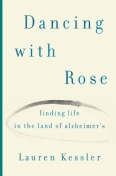
Dancing with Rose: Finding Life in the Land of Alzheimer's
By: Lauren Kessler
buy the book
Reader Comment: "The story has deeply moved me. When I first started reading the book I found it difficult to breathe."

Learning to Speak Alzheimer's: A Groundbreaking Approach for Everyone Dealing with the Disease
By: Joanne Koenig Coste, Robert N. Butler
buy the book
Reader Comment: "Really full of current knowledge on AD. Really helps the caregiver which there are millions of us. Also has a good reference list."

The Simplicity Of Dementia: A Guide For Family And Carers
By: Huub Buijssen
buy the book
Reader Comment: "This book was very informative for me and my family. We were able to understand better what our Mom is going through."
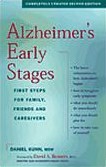
Alzheimer's Early Stages: First Steps for Family, Friends, and Caregivers
By: Daniel Kuhn, David A. Bennett, David A. Bennett (Foreword by)
buy the book
Reader Comment: "A really informative book that points you in the right direction as far as finances, estate planning etc."
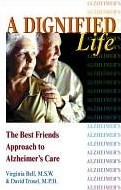
A Dignified Life: The Best Friends Approach to Alzheimer's Care, A Guide for Family Caregivers
By: Virginia Bell, David Troxel
buy the book
Reader Comment:
"This book has helped us with communication, self-esteem, how to still do things together. We feel so much more supported."
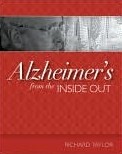
Alzheimer's from the Inside Out
By: Richard Taylor
buy the book
Reader Comment: "In this collection of essays, Richard Taylor gets at the essence of dementia, and how it has redefined his relationships with family, friends and even with himself."
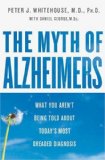
The Myth of Alzheimer's: What You Aren't Being Told About Today's Most Dreaded Diagnosis
By: Peter J. Whitehouse, Daniel George
buy the book
Reader Comment: "This book offers the reader clues to maintain a quality of life as we age. In addition, Dr. Whitehouse brings years of clinical experience presenting ways to reduce the burnout of the caregiver."

Validation Breakthrough: Simple Techniques for Communicating with People with Alzheimer's-Type Dementia
By: Naomi Feil, Vicki de Klerk-Rubin
buy the book
Reader Comment: "This validation technique is simple to learn. It has made my work in a nursing home so much more enjoyable and rewarding."
APA Reference
Staff, H.
(2009, January 4). Books on Alzheimer's Disease, HealthyPlace. Retrieved
on 2026, January 18 from https://www.healthyplace.com/alzheimers/books/books-alzheimers-disease
 Today was your last day of nursery school. I've attempted for days to prepare you for this milestone. To my surprise, when I picked you up, you seemed completely indifferent. You cheerfully said goodbye to all your friends and teachers. You danced around the room while I gathered up your keepsakes. You skipped to the car without so much as a backward glance. "Wow, that was easy," I said to myself, breathing a sigh of relief. Off we go to run errands.
Today was your last day of nursery school. I've attempted for days to prepare you for this milestone. To my surprise, when I picked you up, you seemed completely indifferent. You cheerfully said goodbye to all your friends and teachers. You danced around the room while I gathered up your keepsakes. You skipped to the car without so much as a backward glance. "Wow, that was easy," I said to myself, breathing a sigh of relief. Off we go to run errands.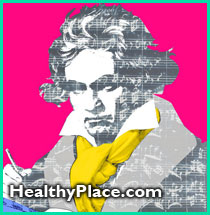 We know him best, of course, by his Choral Symphony, but the Beethoven aficionados have their own favorites: The Seventh Symphony, the Emperor Concerto, the Waldstein Sonata, the later string quartets ... There's no right or wrong choice, here. Sometimes, it can be a Beethoven moment as opposed to a whole piece: the coda in the Egmont Overture, the stormy intro to his Eroica Symphony, the trombones barking out their lofty challenge in the last movement of the Fifth Symphony.
We know him best, of course, by his Choral Symphony, but the Beethoven aficionados have their own favorites: The Seventh Symphony, the Emperor Concerto, the Waldstein Sonata, the later string quartets ... There's no right or wrong choice, here. Sometimes, it can be a Beethoven moment as opposed to a whole piece: the coda in the Egmont Overture, the stormy intro to his Eroica Symphony, the trombones barking out their lofty challenge in the last movement of the Fifth Symphony. Well firstly, I apologise for my entry being a little late! I seem to have quite a few projects running at the moment. Two of them being with Healthyplace.com. My site's been added to their OCD Community section! Just about all of it's been put up, so hopefully OCD awareness is being promoted a bit further. Plus, I shall be trained to become a Support Host for the OCD Community on Wednesday. I'm really excited about it, and see it as another way to turn what was an OCD negative into a positive.
Well firstly, I apologise for my entry being a little late! I seem to have quite a few projects running at the moment. Two of them being with Healthyplace.com. My site's been added to their OCD Community section! Just about all of it's been put up, so hopefully OCD awareness is being promoted a bit further. Plus, I shall be trained to become a Support Host for the OCD Community on Wednesday. I'm really excited about it, and see it as another way to turn what was an OCD negative into a positive.